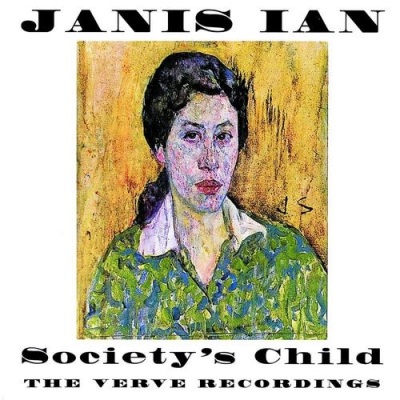
Society's Child: Verve Recordings
A singer/songwriter both celebrated and decried for her pointed handling of taboo topics, Janis Ian enjoyed one of the more remarkable second acts in music history; after first finding success as a teen, her career slumped, only to enter a commercial resurgence almost a decade later. The child of a music teacher, Janis Eddy Fink was born on May 7, 1951, in New York City; she studied piano as a child, and, drawing influence from Edith Piaf, Billie Holiday, and Odetta, wrote her first songs at the age of 12. She soon entered Manhattan's High School of Music and Art, where she began performing at school functions; after adopting the surname Ian (her brother's middle name), she quickly graduated to the New York folk circuit. When she was just 15, she recorded her self-titled debut; the LP contained "Society's Child (Baby I've Been Thinking)," a meditation on interracial romance written by Ian while waiting to meet with her school guidance counselor. While banned by a few radio stations, the single failed to attract much notice until conductor Leonard Bernstein invited its writer to perform the song on his television special Inside Pop: The Rock Revolution. The ensuing publicity and furor over its subject matter pushed "Society's Child" into the upper rungs of the pop charts, and made Ian an overnight sensation. Success did not agree with her, however, and she soon dropped out of high school; in rapid succession, Ian recorded three more LPs — 1967's For All the Seasons of Your Mind, 1968's The Secret Life of J. Eddy Fink, and 1969's Who Really Cares — but gave away the money she earned to friends and charities. After meeting photojournalist Peter Cunningham at a peace rally, the couple married, and at age 20, she announced her retirement from the music business. The marriage failed, however, and she returned in 1971 with the poorly received Present Company. After moving to California to hone her writing skills in seclusion, Ian resurfaced three years later with Stars, which featured the song "Jesse," later a Top 30 hit for Roberta Flack. With 1975's Between the Lines, Ian eclipsed all of her previous success; not only did the LP achieve platinum status, but the delicate single "At Seventeen" reached the Top Three and won a Grammy. While subsequent releases like 1977's Latin-influenced Miracle Row, 1979's Night Rains, and 1981's Restless Eyes earned acclaim, they sold poorly; Ian was dropped by her label, and spent 12 years without a contract before emerging in 1993 with Breaking Silence (the title a reference to her recent admission of homosexuality), which pulled no punches in tackling material like domestic violence, frank eroticism, and the Holocaust. Similarly, 1995's Revenge explored prostitution and homelessness. Two years later Ian returned with Hunger; God & the FBI followed in the spring of 2000. A live set, Working Without a Net, appeared from Rude Girl Records in 2003, and a DVD, Live at Club Cafe, saw release in 2005. Folk Is the New Black appeared as a joint release from Rude Girl and Cooking Vinyl in 2006.
